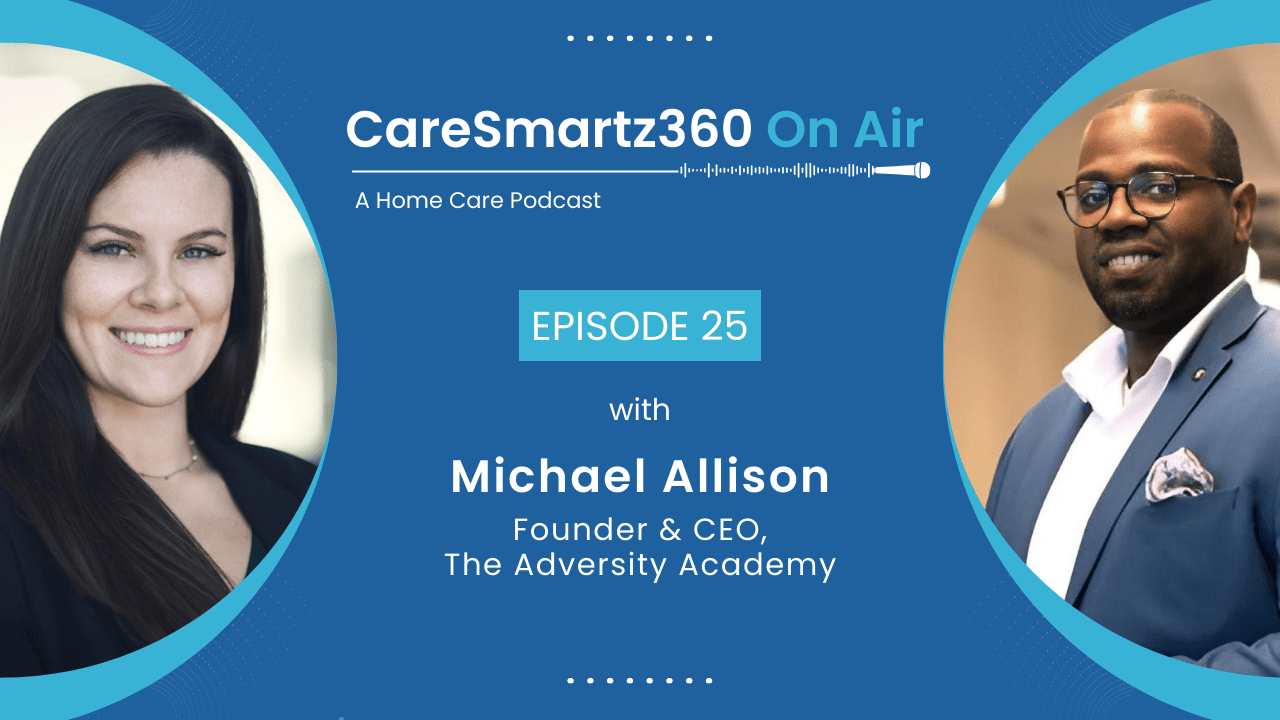Unleashing Leadership Potential in Home Care
00:00:04.200 –> 00:00:24.010
Erin Cahill: Welcome to CareSmartz360 on Air, a home care Podcast. I’m Erin Cahill, Account, executive at Caresmartz. In the world of home care. Strong leadership is crucial for both caregivers and clients. To start with. Empowerment is key, provide caregivers with opportunities to make decisions and take ownership of their clients’ care. This fosters confidence and initiative.
00:00:24.780 –> 00:00:46.440
Erin Cahill: Next, invest in development offer training programs that hone leadership skills, like communication delegation and problem solving encourage caregivers to mentor new hires, boosting their confidence and fostering a sense of teamwork. Also recognize and reward celebrate achievements, both big and small. Public recognition for leadership qualities, motivates caregivers, and sets a positive example for others
00:00:46.440 –> 00:00:57.289
Erin Cahill: by empowering caregivers, investing in their growth and acknowledging their contributions. You can cultivate a strong leadership pipeline within your home care team, ultimately benefiting both caregivers and the clients they serve.
00:00:57.340 –> 00:01:02.109
Erin Cahill: Today we have Michael Allison on the panel, who is the founder of The Adversity Academy
00:01:02.300 –> 00:01:14.399
Erin Cahill: A global leadership training and consulting firm which assists in recruiting, promoting, and nurturing outstanding leaders, welcome to the podcast Michael.
00:01:14.820 –> 00:01:16.840
Michael W. Allison, MBA: Thank you so much for having me, Erin. It’s a pleasure.
00:01:17.640 –> 00:01:28.669
Erin Cahill: So we’ll jump right into it. Burnout and compassion, fatigue are real concerns in home care. How can leaders cultivate compassion, leadership that prioritizes both caregiver, well-being, and client care.
00:01:29.120 –> 00:01:47.079
Michael W. Allison, MBA: Yes, absolutely. I think that’s a great question. Leaders can cultivate compassionate leadership by 1st acknowledging the signs of burnout and compassion, fatigue in their
teams, implementing regular check-ins, offering mental health resources and fostering an open environment where caregivers can feel safe to express struggles.
00:01:47.670 –> 00:02:06.569
Michael W. Allison, MBA: And I think those are some crucial steps. Additionally, I think, providing professional development opportunities focused on stress management, resilient training and self care can empower caregivers to maintain their well-being. I think leaders should model compassion, empathy, and demonstrate a balance between client care and caregivers for their team.
00:02:07.420 –> 00:02:15.169
Erin Cahill: Absolutely. And how can home care agency owners be best equipped to empower and develop their caregivers, fostering a sense of ownership and growth.
00:02:15.870 –> 00:02:36.279
Michael W. Allison, MBA: Another great question. So agency owners can empower caregivers by invest in in their continuous education professional development. That’s what has helped me to the things that I’m doing now. This includes offering training programs, mentoring opportunities and a clear career progression path. So recognizing and rewarding achievements, providing autonomy in their roles
00:02:36.330 –> 00:02:49.709
Michael W. Allison, MBA: and involving caregivers and decision-making processes, can also foster a sense of ownership, creating a supportive and inclusive culture where caregivers feedback is valued and acted upon. Acted upon is essential for growth and empowerment.
00:02:50.943 –> 00:02:58.310
Erin Cahill: How can home care agencies build a culture that prioritizes client needs and fosters excellent service delivery,
14
00:02:58.880 –> 00:03:00.659
Michael W. Allison, MBA: Yes, I think that
00:03:00.720 –> 00:03:27.080
Michael W. Allison, MBA: to build a culture that prioritize client needs agencies should establish clear values and standards that emphasize client centric care, regular training on empathy, communication and cultural competencies can enhance caregivers, ability to meet diverse client needs effectively encouraging teamwork, recognizing exceptional services and maintaining open lines of communication between clients, caregivers, and management are vital. I think agencies should also
00:03:27.220 –> 00:03:35.340
Michael W. Allison, MBA: implement continuous improvement processes, soliciting feedback from clients and care for caregivers to refine the services, and the practices as well too.
00:03:36.020 –> 00:03:43.159
Erin Cahill: Absolutely in the context of home care providers, what metrics can be used to measure the impact of leadership development programs.
00:03:44.850 –> 00:04:00.340
Michael W. Allison, MBA: Metrics to measure the impact of leadership development programs includes employee satisfaction, I think, is a big key right? I think retention rate is another one. There, that’s quite important. Client satisfaction scores, and the incidence of
00:04:00.700 –> 00:04:22.739
Michael W. Allison, MBA: like caregivers, burnout on turnovers. I also believe that performance metrics such as the Norfolk successful, completed training that you have the promotions that’s within your teams and the overall agency growth can also provide insights additionally evaluating the implementation of leadership practices throughout regular performance. Reviews and feedback surveys can help assess the program’s effectiveness.
00:04:23.930 –> 00:04:31.170
Erin Cahill: And how can home care leaders develop the skills and strategies to scale their operations while maintaining a strong leadership? Culture.
00:04:32.030 –> 00:04:45.199
Michael W. Allison, MBA: I believe that home care leaders can scale operations effectively by adopting a strategic approach that includes a robust leadership, training and succession planning, developing skills and delegation. Time management and strategic planning is crucial
00:04:45.400 –> 00:05:10.170
Michael W. Allison, MBA: leaders can focus on building a scalable infrastructure with efficient processes and technology maintaining a strong leadership. Culture requires continuous communication of the agency’s vision and values that it also ensures that all team members are aligned. Leaders should also foster a culture of innovation, encouraging new ideas, improvements to support the growth while preserving the core principle
00:05:10.200 –> 00:05:12.950
Michael W. Allison, MBA: of compassion and client-centered care.
00:05:14.160 –> 00:05:24.309
Erin Cahill: Thank you, Michael, for sparing your time and sharing those great insights. I’m sure the audience found these useful, and thank you all for tuning in until our next episode. This is Erin Cahill. Signing off.
00:05:25.340 –> 00:05:25.919
Michael W. Allison, MBA: Thank you so much
